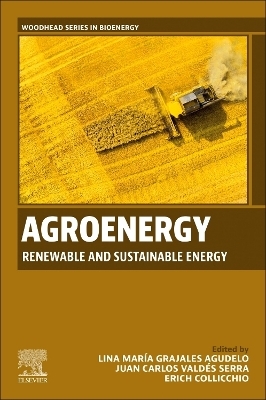
Agroenergy
Woodhead Publishing (Verlag)
978-0-443-21430-1 (ISBN)
This book will be of interest to scientists, researchers, engineers, industrial practitioners, graduate and postgraduate students, and anyone working in any agroenergy sector.
Lina María Grajales Agudelo is Assistant Professor IV at the Federal University of Tocantins (UFT) in Brazil. She is part of the undergraduate course in Food Engineering and the Graduate Program in Digital Agroenergy, and works on the development of bioreactors for solid-state fermentation aimed at producing biofuels using agro-industrial residues as substrates. Dr. Grajales Agudelo is the Coordinator of the Support Group for Foreigners (GAE) and the leader of the "Bioreactor Engineering" (GeBio) Research Group at the same university. She is a chemical engineer who graduated from the National University of Colombia (UNAL) and holds a master's and doctoral degree in Engineering and Food Science respectively, both from São Paulo State University (UNESP), Brazil. Her dissertation and thesis focused on the development of rotary drum bioreactors for solid-state fermentation. She co-edited a book on Agroenergy with Elsevier, which published in 2023. Graduated in Mechanical Engineering from "Universidad de Oriente. Santiago de Cuba-CUBA holds a master’s degree in Mechanical Engineering from State University of Campinas-SP, Brazil (UNICAMP) and a Doctorate in Mechanical Engineering from State University of Campinas -SP, Brazil (UNICAMP). He is currently a Full Professor at the Federal University of Tocantins Foundation (UFT) Brazil. He has experience in Mechanical Engineering, with an emphasis on Materials and Manufacturing Processes, acting on obtaining composite materials and sustainable development. Specialist in Irrigation Engineering from the Federal University of Viçosa (UFV), holds a master’s degree in Genetics and Plant Breeding from the Federal University of Lavras (UFLA), a Doctorate in Applied Ecology from the University of São Paulo (USP), and a Postdoctoral internship in Phytotechnics in the Federal University of Viçosa (UFV) by the PROCAD-AM program. He is an Associate Professor at the Federal University of Tocantins (UFT). He teaches in the Undergraduate Program in Environmental Engineering and in the Graduate Program in Digital Agroenergy. He has experience in scientific research in the area of Agricultural Sciences and the Environment, with an emphasis on Planning and Management in Agricultural Science, Technology and Innovation, Genetic Improvement of Plants, and Phytotechnics. He is currently developing work focusing on agroenergy crops, agroclimatic zoning, carbon storage, and environmental changes.
Part I: Fundamentals of Agriculture for Biofuel Production 1. Use- Value Assessment, Land Development, and Irrigation Investment Aiming to Biofuel Production 2. Environmental and Energy Performance Assessment of the Agricultural Stage in Fresh Oil Palm Production 3. Effect of Year and Sowing Times on Low Latitude Soybean Aiming at Biofuel Production 4. Non-Edible Crops as Alternative Raw Materials for Biodiesel Production – An Overview 5. The Biodiesel Agro-Industrial Complex in Brazil and The Performance of The National Biodiesel Production Program 6. Potential Effects of Future Climatic Scenarios on The Agroclimatic Aptitude of Eucalyptus Urophylla in the Matopiba Region
Part II: Biofuel Production: Classification According To The Generation Of Feedstock 7. Valorization of Corn Wastes: Assessing The Environmental Impacts in A Life-Cycle Perspective 8. EFB (Empty Fruit Bunches) of Oil Palm for 2G Ethanol Production 9. Sugarcane Residues: Insights on Exploitation, Energetic And Non-energetic Uses, and The Production Potential in Brazil and in the State of Tocantins 10. Taking Advantage of Dairy Whey for Bioethanol Production – Case Study of Dairy Industry at New Zealand 11. Feasibility Study for the Biodiesel Production from Cooking Oil in Dianópolis, Tocantins 12. Anaerobic Co-Digestion of Manipueira with Bovine Manure for Biogas and Biofertilizer Production 13. Microalgae-Based Biofuels: Advances And Challenges
Part III: Bioenergy Production Technologies 14. Use Of Ionic Liquids in the Pretreatment of Lignocellulosic Biomass 15. The Importance of Microorganisms for Biofuels Production 16. Use of Agro-Energy Waste: Some Current Technologies 17. Waste and Biomass Valorisation Via its Transformation into Advanced Materials for Energy Applications 18. Immobilization of Lipases from the Fungus Metarhizium Anisopliae Icbc 425 Using Babassu Nut Bagasse as Substrate on Cellulose Fibers from Lulo Stalks 19. Heat Analysis of a Sugarcane Bagasse and Wheat Bran System in Rotating Drum Bioreactor for Cellulase Production
| Erscheinungsdatum | 26.09.2023 |
|---|---|
| Reihe/Serie | Woodhead Series in Bioenergy |
| Sprache | englisch |
| Maße | 152 x 229 mm |
| Gewicht | 1000 g |
| Themenwelt | Naturwissenschaften ► Biologie ► Ökologie / Naturschutz |
| Naturwissenschaften ► Physik / Astronomie ► Thermodynamik | |
| Wirtschaft ► Volkswirtschaftslehre | |
| ISBN-10 | 0-443-21430-1 / 0443214301 |
| ISBN-13 | 978-0-443-21430-1 / 9780443214301 |
| Zustand | Neuware |
| Haben Sie eine Frage zum Produkt? |
aus dem Bereich


